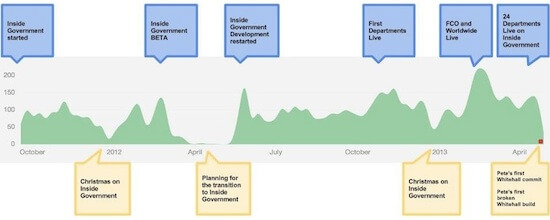Friday 3rd May, 2013
Week 224
It’s been another busy week in the FutureLearn “submarine”1 deep below the streets of sunny Camden. Today marks the end of our first full two-week sprint on the project and it feels as if the application is really starting to take shape.
As Tom mentioned a couple of weeks ago, there’s no shortage of ideas for this project - indeed I’ve just discovered a whole bunch of ideas, user stories and educator stories which I didn’t know about! - the challenge is to identify the functionality that will provide the most value and to focus on delivering that functionality as rapidly as possible, while maintaining a high level of quality.
For obvious reasons, the FutureLearn project isn’t developing quite as publicly as Inside Government, so we’re probably not going to be able to give you such a blow-by-blow account of development, but hopefully more stuff will be in the public domain in the not too distant future. I’m certainly finding it interesting learning about the likes of MOOCs, constructivist learning, and flipped classrooms.
Building products
Given we’re pretty flat out on FutureLearn, nothing much has been happening with our various internal projects. However, over the last few weeks I’ve been doing a bit of thinking about how we should approach building some products of our own. One thing I want to explore a bit with my colleagues is whether we should be using what I’m calling the “build it and they will come” approach or the Lean Startup-esque “hypothesis-driven experimental” approach.
I think we (and probably most developers) are naturally drawn to the former - build something to solve a problem that you or your family or friends are having; then hope that other people find out about it and start using it in droves. It all sounds well and good, but I think the latter stage is a lot harder than one might think. Should you give up on a project just because not many people are using it? Or should you work more proactively to attract people to it via advertising or other promotional tactics?
For me the latter approach is less natural, but very logical. The idea of trying to generate hypotheses and then testing them by writing as little code as possible seems eminently sensible. But I think this approach requires us to think of ourselves less as developers and more as business types, which I know we find difficult. Anyway, I’m definitely up for trying more of this kind approach. Hopefully my colleagues are too!
Consultancy?
On a related note, I think we’ve tended to market2 ourselves as a ready-made software development team - greater than the sum of its parts - but a development team none-the-less. However, I think we actually do a lot more than just development. I can’t come up with a better word for this other than “consultancy”, but unfortunately that word has so many negative connotations. Naturally, we just do the good bits ;-)
I know that collectively we won’t want to talk about ourselves as consultants, but I do think we need to find a better way to explain that we do a lot more than just software development. Does anyone have a better word for what we do?!
Inside Government
At the beginning of the week, our GDS colleagues were marking a major milestone - 10 Downing Street, the Deputy PM’s office, all 24 of the UK’s central government departments and its embassies around the world are now sharing a single, joined-up presence on the web at www.gov.uk/government.
And Neil Williams eloquently explained its significance:
From now on, citizens (and the professionals and intermediaries who operate between them and the state) can easily see the entirety of what this and any future government is doing, on all issues at home and around the world, in one place and in consistent, structured, easily comprehensible formats. Some of the content is also available in one or more other languages (49 languages in total).
Tom & Chris were able to meet up with the team on Tuesday evening for a few deserved celebratory drinks and it sounds as if a good time was had by all. And some people even made it to work the next day!
Although Go Free Range hasn’t been so involved over the last few months of the project, Pete Herlihey’s graph3 put the project as a whole into perspective for me. And I’m pleased to see that James & I are still up there on the leaderboard ;-)
The Inside Government project was definitely a great project to work on and a great team to work with. I think I can speak for the rest of GFR in saying that it’s something we’re really proud of.
Until next time.
– James.


If you have any feedback on this article, please get in touch!
Historical comments can be found here.